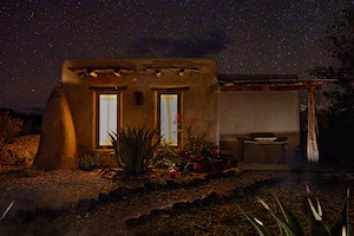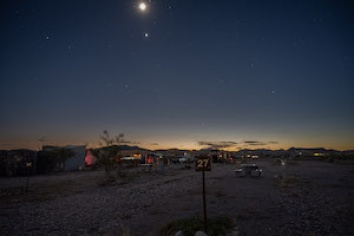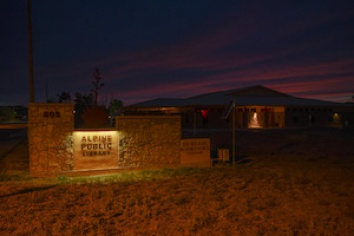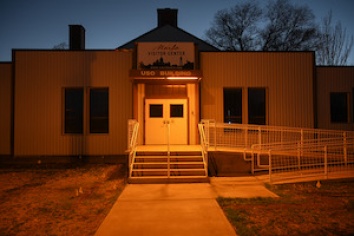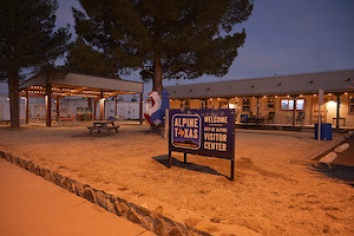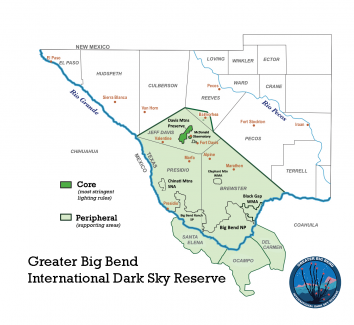Ghost Town Casitas hotel in Terlingua, Texas. Image credit: JD Swinger.
West Texas Businesses Preserve Night Sky – One Light Bulb at a Time
15 August 2023
BY EMILY HOWARD
McDonald Observatory’s Dark Skies Initiative recognizes five West Texas businesses and public organizations for adopting night sky friendly lighting practices. The Alpine Visitor Center, Alpine Public Library, Marfa Visitor Center, RoadRunner Travelers RV Park in Terlingua, and Ghost Town Casitas hotel in Terlingua
"We're fortunate to have such a special place out here,” says Coleman Davis, owner of Ghost Town Casitas. “And we are more than happy to help play a role in preserving dark skies for everyone.”
West Texas has long been a popular travel destination, thanks in part to its night skies. Many of the region’s top attractions – McDonald Observatory, Big Bend National Park, Big Bend Ranch State Park, and more – feature public programs that connect visitors to wide open, star-filled skies.
However, as tourism increases, it threatens to dim those stars. “There have been many concerns within the local community that with growing tourism and more development
That light pollution can also impact McDonald Observatory’s ability to conduct scientific research.
McDonald Observatory Helps Properties Improve Lighting
To help protect the night sky it depends upon, the Observatory
Recommended outdoor lighting practices include:
- Shielding lightbulbs and aiming them down
- Choosing amber-colored lights
- Limiting the intensity of light
- Turning off lights when they are not needed
The Dark Skies Initiative works with properties to implement these night sky friendly lighting practices. And in 2021, it established a recognition program to certify those that do. Since then, it has certified
As awareness of the initiative grows, an increasing number of the organizations catering to the tourism industry are taking steps to ensure their properties don’t impact the star-filled views that bring many of their visitors. “Thanks to these properties using night sky friendly lighting,” says Hummel, “they are not only helping to preserve our dark skies, but also the broader economy of the region.”
Protecting the Darkest Skies in the Continental U.S.
McDonald Observatory
In addition to its appeal to visitors, the low levels of light pollution have positive impacts on the Observatory’s ability to conduct its research; the health of humans, wildlife, and the environment; and the area’s natural beauty.
“Alpine is really proud of the Visitor Center updates,” says Chris Ruggia, director of tourism for the City of Alpine. “And we especially love that we can put some skin in the game towards protecting our night sky in the largest dark sky reserve in the world!”
Nominate – or Become – a Night Sky Friendly Property
If you have or know of a property that follows night sky friendly lighting practices, you can nominate it to be recognized by the Dark Skies Initiative. Nominees do not need to perfectly conform to the recommended lighting guidelines to be considered –
The Observatory hopes to eventually work with each of its neighbors in the Greater Big Be
- END –
Contacts
Emily Howard
Communications Manager, McDonald Observatory
emily.howard@austin.utexas.edu
512-475-6763
Stephen Hummel
Dark Skies Initiative Coordinator, McDonald Observatory
432-426-4170
A Dark Sky Reserve is a land possessing exceptional quality of starry nights that is specifically protected for its scientific, natural, educational, or cultural value. DarkSky International certifies areas as dark sky places. The Greater Big Bend International Dark Sky Reserve (DSR) is a partnership between many communities, parks, businesses, and conservation groups in Texas and Mexico to help protect our shared night sky through better outdoor lighting. Covering over 15,000 square miles, the Greater Big Bend International Dark Sky Reserve is the largest DarkSky International-certified place in the world. The goal of the DSR is to protect the night sky from the spread of light pollution through the use of night sky friendly lighting practices.


